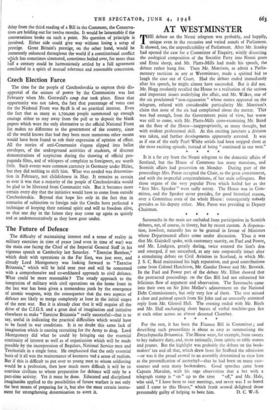AT WESTMINSTER
THE debate on the Nenni telegram was probably, and happily, unique even in the extensive and varied annals of Parliament. It showed, too, the unpredictability of Parliament. After Mr. Stanley
had opened the case for a Committee of Enquiry, wittily dissecting the zoological composition of the Socialist Party into Nenni goats
and Ernie sheep, and Mr. Plans-Mills had made his speech, the debate rather hung , fire. Then Mr. Morrison, as adroit a Parlia- mentary tactician as any at Westminster, made a spirited bid to laugh the case out of Court. Had the debate ended immediately after his speech, he might almost have succeeded. But it did not. Mr. Hogg resolutely recalled the House to a realisation of the serious and important issues underlying the affair, and Mr. Wilkes, one of the six proclaimed " non-signatories " whose names appeared on the telegram, refuted with considerable particularity Mr. Morrison's claim that none of the six had complained about the matter. This' -was bad enough, from the Government point of view, but worse was still to come, with Mr. Platts-Mills cross-examining Mr. Baird on the floor of the House—inappropriately, as many thought, but with evident professional skill. At this exciting juncture a division was taken, and further developments apparently arrested. It was as if one of the early Pearl White serials had been stopped short at
the most exciting episode, instead of being "continued in our next." * * It is a far cry from the Nenni telegram to the domestic affairs of Scotland, but the House of Commons has many mansions, and Scottish affairs had possession on Monday. During part of the proceedings Mrs. Paton occupied the Chair, to the great contentment, and with the respectful congratulations, of her male colleagues. But those organs of the very popular Press which hailed her as the "first Mrs. Speaker" went sadly astray. The House was in Com- mittee, and the Speaker never presides, for good historical reason, over a Committee even of the whole House : consequently nobody presides as his deputy either. Mrs. Paton was presiding as Deputy Chairman.
* * * Sassenachs in the main are excluded from participation in Scottish debates, not, of course, in theory, but by recent custom. A dispensa- tion, however, naturally has to be granted in favour of Ministers whose Departmental affairs come under discussion. Thus it was that Mr. Gaitskell spoke, with customary suavity, on Fuel and Power, and Mr. Lindgren, greatly daring, twice entered the lion's den and emerged, if not unscathed, at any rate corporeally intact after a stimulating debate on Civil Aviation in Scotland, in which Mr.
J. S. C. Reid maintained his high reputation, and good contributions came from Colonel Hutchison, Mr. Gandar Dower and Mr. Beswick. In the Fuel and Power part of the debate Mr. Elliot showed that the protracted proceedings on the Gas Bill had not exhausted his felicitous flow of argument and observation. The Sassenachs came into their own on Sir John Mellor's adjournment on the National Debt Commissioners, but only very few of them. The rest missed a clear and pointed speech from Sir John and an unusually animated reply from Mr. Glenvil Hall. The evening ended with Mr. Birch and Mr. Hall exchanging short bursts of verbal machine-gun fire at each other across an almost deserted Chamber.
* * * * For the rest, it has been the Finance Bill in Committee ; and describing such proceedings is about as easy as summarising the Encyclopaedia Britannica. The House went, for example, from sweets to key industry duty, and, more rationally, from spirits to table waters and prunes. But the highlight was probably the debate on the book- makers' tax and all that, which drew from Sir Stafford the admission —or was it the proud avowal to an assembly determined to view him as the personification of austerity?—that he had been on many race- courses and seen many bookmakers. Good speeches came from Captain Marsden, with his sage observation that a bet with a telegraph stamp is "on" up to the time "off," and Mr. Hale, who said, "I have been to race meetings, and never was I so bored until I came to this House," which frank avowal delighted those presumably guilty of helping to bore him. D. C. W.-S.


































 Previous page
Previous page